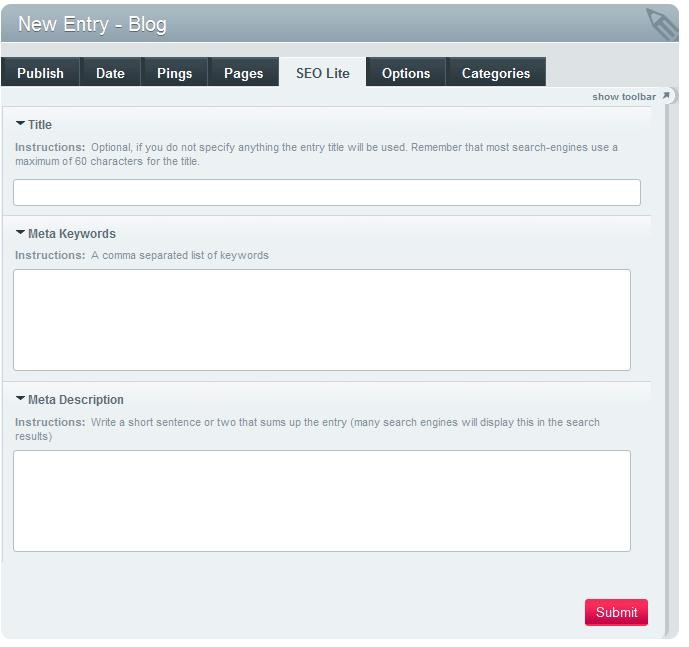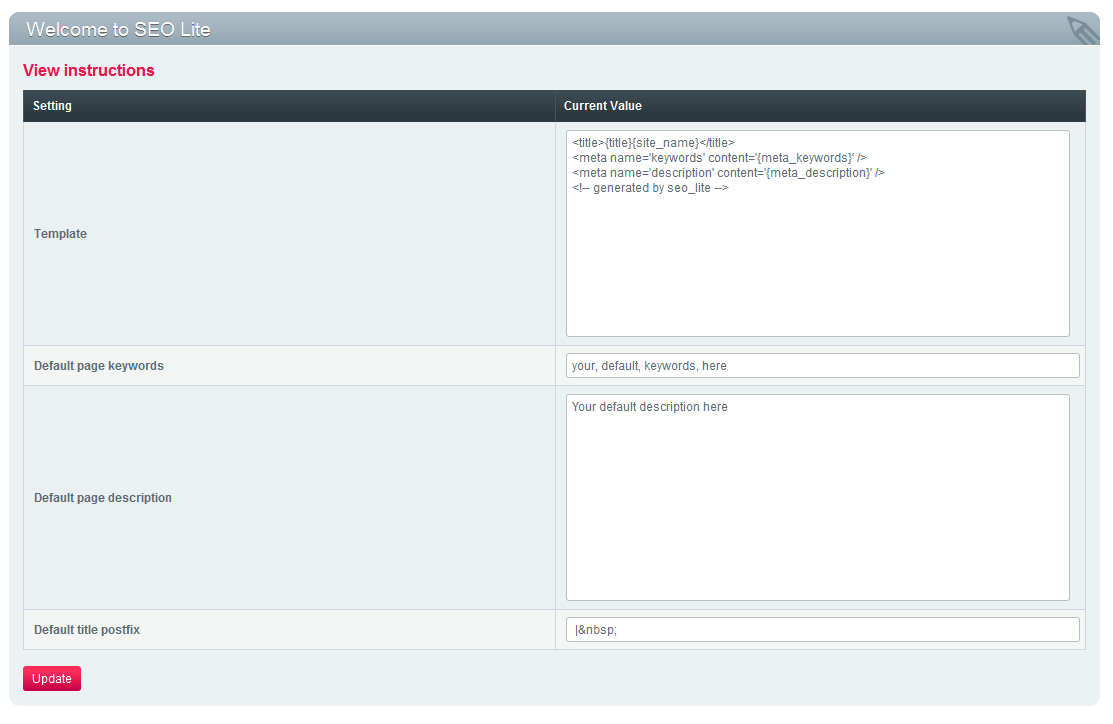SEO Lite is a lightweight addon for ExpressionEngine which will add a tab where the user can specify meta keywords, descriptions and alternatively override the title with a SEO optimized version.
Unzip the downloaded zip and place the 'seo_lite' folder in /expressionengine/third_party/. In the ExpressionEngine Control Panel navigate to Addons -> Modules and click "Install" next to the "SEO Lite" addon.
That's it!
After installing SEO Lite your publish entry form will have an extra tab like this:

If you navigate to Addons -> Modules -> SEO Lite you will see some settings. They're default values for the module, and are pretty self-explanatory:

Here's a video of implementing SEO Lite in an existing design. Note that it does not contain any audio:
There’s just one tag – {exp:seo_lite} – and it will fetch the template you edit in the backend and populate it with the entry specific data (title/keywords/description)
You can fetch by segment or entry_id.
The SEO Lite template may contain most variables available in standard EE templates.
<title>{title} - {site_name}</title>
<meta name='keywords' content='{meta_keywords}' />
<meta name='description' content='{meta_description}' />
You can also use segments (note how to do conditionals here)
<title>{site_name} - {if '{segment_2}' != ''}{segment_2} - {/if}{title}</title>
<meta name='keywords' content='{meta_keywords}' />
<meta name='description' content='{meta_description}' />
<link rel='canonical' href='{canonical_url}' />
Here's an example of a blog which uses a global embed which is embedded at the top of every template.
The global header in embeds/global_header:
<html>
<head>
{exp:seo_lite use_last_segment='yes'
title_postfix='{embed:title_postfix}'
default_title='{embed:default_title}'
default_keywords='{embed:default_keywords}'
default_description='{embed:default_description}'
}
</head>
<body>
Our site index:
{embed="embeds/global_header"}
No need to change anything here. Just embed it and SEO Lite will output the default info, which is exactly what we want on the site frontpage.
In our case the title output will be: WeDoAddons
Our blog/index:
{embed="embeds/global_header" default_title="The Blog" default_description="The index of the WeDoAddons blog"}
Here we override the title and description to make those fit the blog better.
The title in /blog/ will in our case be: The Blog | WeDoAddons
Our blog/entry template:
{embed="embeds/global_header" title_postfix=" | The Blog"}
Since SEO Lite will find the entry in this case title, description and keywords will be populated with entry specific content. So we don't need to change those. The only thing we want to do is add " | The Blog" after the entry title.
So the title in /blog/entry/welcome_to_our_new_blog will in our case be: Welcome To Our New Blog | The Blog | WeDoAddons
SEO Lite supports the "canonical" meta tag to specify the canonical URL. For more information about the rel="canonical" tag in general read this and this.
For advanced users the ignore_last_segments parameter can be used to specify that the X last segments should be ignored when it comes to the canonical url. A use case here is e.g. an URL which contain a sort parameter, e.g. http://example.com/cars/listings/sort/asc <- you would not want sort/asc to be part of the canonical url so in this case you'd specify ignore_last_segments="2". Note that this parameter also affects entry lookup when you use the use_last_segment="yes".
SEO Lite supports Multiple Site Manager. To get it to work simply switch to the new site, navigate to the SEO Lite settings and save them on the new site.
Note; if you are pulling content from site_1 in a template on site_2 for instance you'll need to pass site_id="1" to SEO Lite for it to find the content (it will default to the current site_id).